Share to your socmed!
Main Article
Teens Say They Need Sex Education: Magdalene Survey
Comprehensive sex education is said to be the solution for a number of adolescent sexuality problems. What do teenagers have to say about this?
.jpg)
*Trigger warning: Description of sexual violence, abuses, strong words*
“My boyfriend pulled his genital out of his pants and asked me to suck it. It was the first time in my life I saw a grown man's penis. I was shocked, confused, scared, a lot of mixed feelings,” said “Desi” recalling her experience five years ago. She was a 12th grader in high school at the time, while "Doni", her boyfriend who was two years her senior, was a university student.
In Doni’s boarding room, Desi was still processing her shock, when suddenly Doni forced his penis into her mouth. "I couldn't think much, what I knew from talking with my friends was that couples usually do this for love. So I gave in," she told Magdalene.
Now 22 years old, she attributed her experience to a lack of knowledge and experience. In school, she had learned about reproductive organs and abstinence. There was nothing about safe sex, or sexual consent, much less healthy relationship, she added.
That experience was imprinted in her mind, but only later on that she realized she was a victim of violence because she was forced to have sex without her consent. Her relationship with Doni is now over, but Desi has learned the importance of consent, which is often absent when teenagers learn about sexuality both at school and in the family.
Currently elements of sexuality education covering mostly reproductive health system are taught in Biology class in high schools. Other modules on risky sexual behavior aimed to prevent the spread of HIV/AIDS prevention are taught in Physical and Health Education subject.
Desi’s story echoes those of others and provides a great argument for the urgency of sex education for teenagers. But how should sex education be packaged ideally?
To answer this question, Magdalene conducted an online survey from November 2 to 15, 2021. Participated by 405 people s aged 15-19, the survey showed that 98.5 percent of respondents say they need sex education. Furthermore only 12.84 percent of the respondents consider the “sex education” they receive in schools to be adequate.
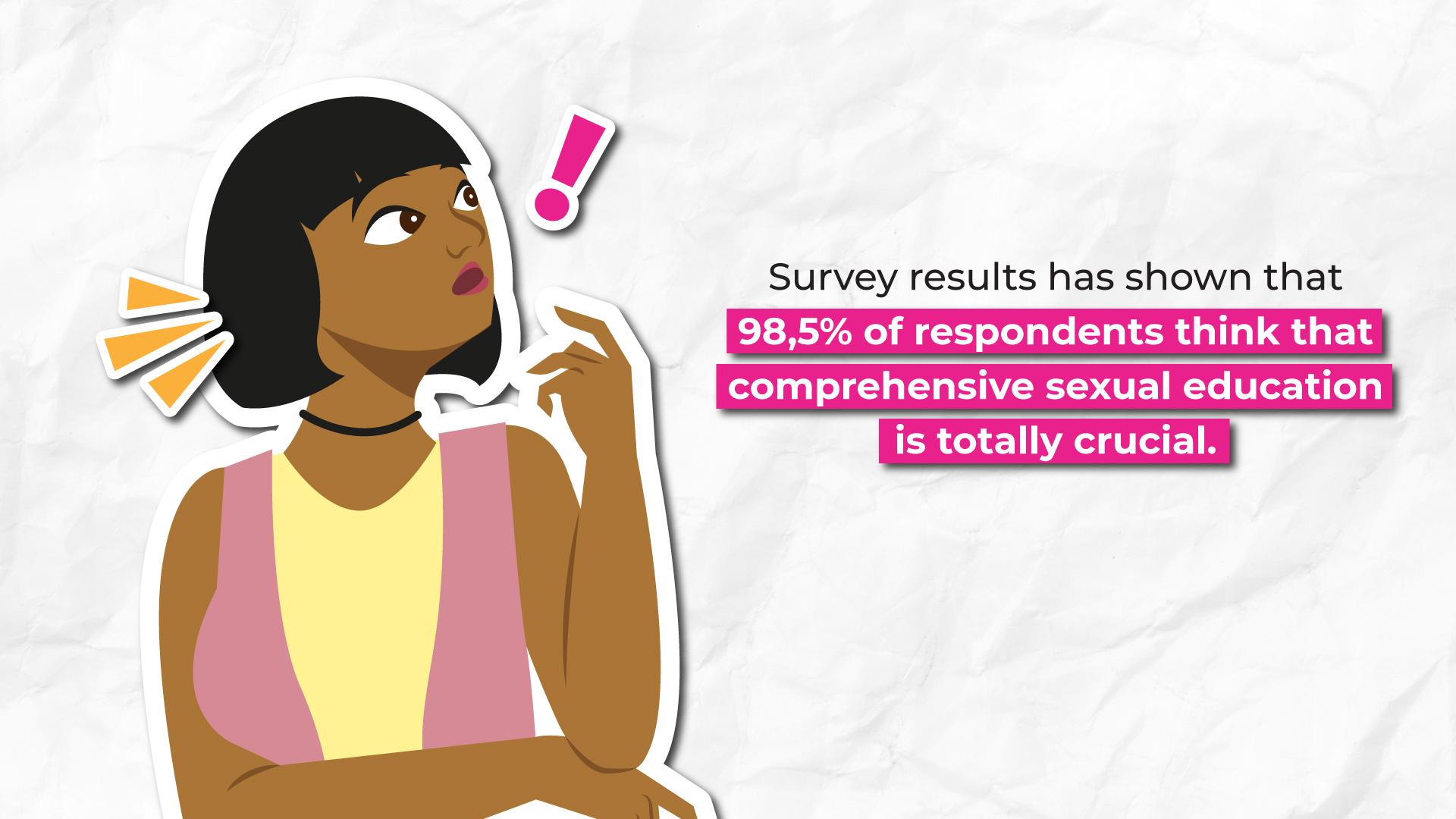
Visual 1: As many as 98.5 percent respondents admit that they need sex education. Only 12.84 [percent considered the “sex education” they receive in schools to be adequate
The survey was distributed through various social media platforms including Twitter, Facebook, and Instagram. It was also distributed through Magdalene's networks, including organizations like the Independent Youth Alliance (ARI) to Reprodukasi, as well as teachers, students, and parents.
Participants come from 148 cities in 32 provinces, and 69 percent of the respondents are from Java. West Java is the province most represented, followed by East Java and Greater Jakarta. With the questionnaires randomly distributed, this survey does not represent the 15-to-19-year-olds in Indonesia as a whole, but it managed to capture the need for sex education among teenagers of this age range.
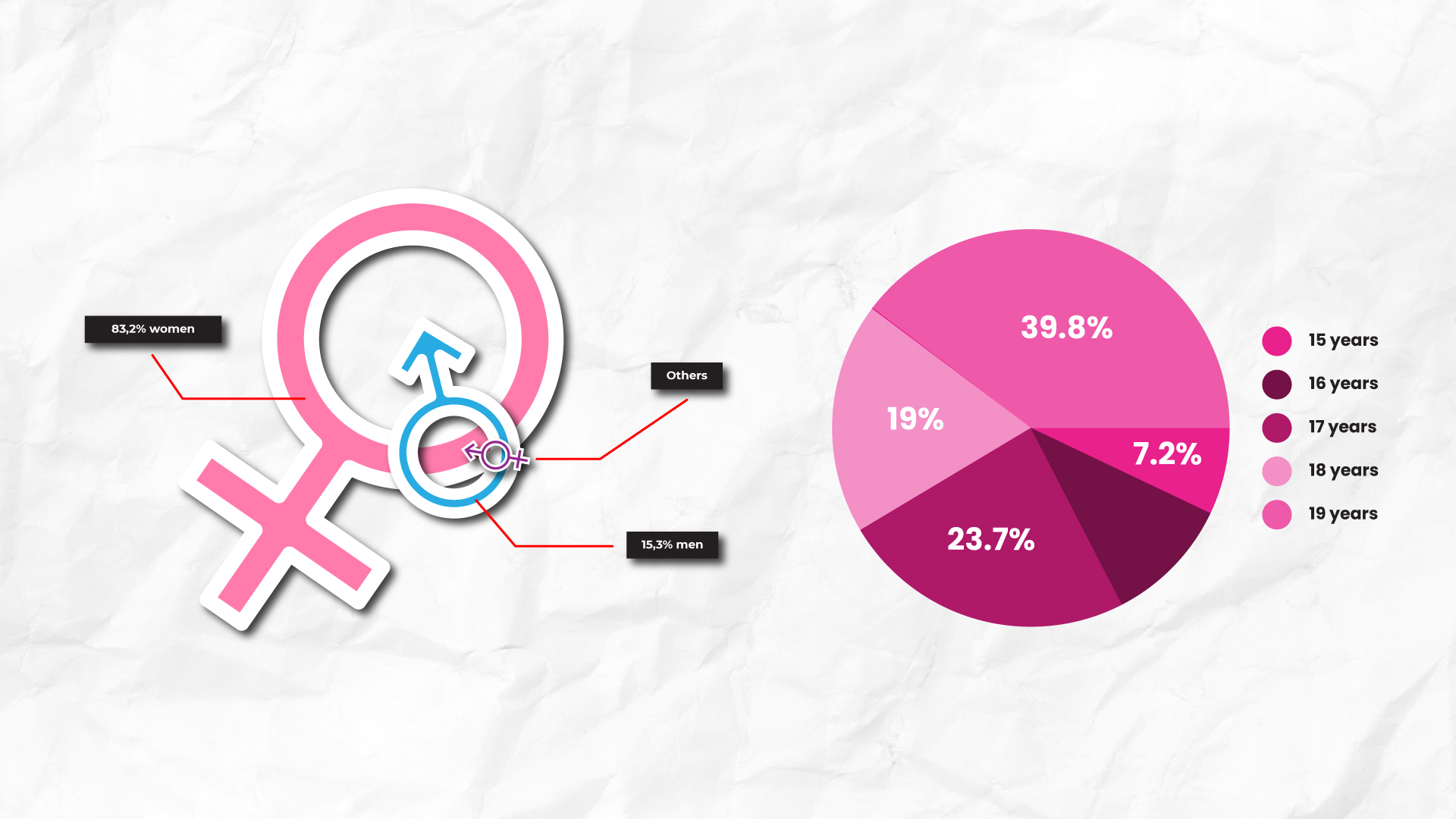
Visual 2: Distribution of respondents in terms of gender and age.
1st Survey Finding: Majority Agree They Need Sex Ed
The survey also produced other important findings. Among them are the reasons given by the respondents on why they really need sex education.
As many as 97.53 percent agree that sex education is important although they have yet to have any intention to be sexually active. In addition, sex education is seen as being able to help build healthy relationships with partners (96.79 percent). They also agree that sex education can prevent sexual violence (96.54 percent), unwanted pregnancies (97.04 percent), and sexually transmitted diseases (98.02 percent).
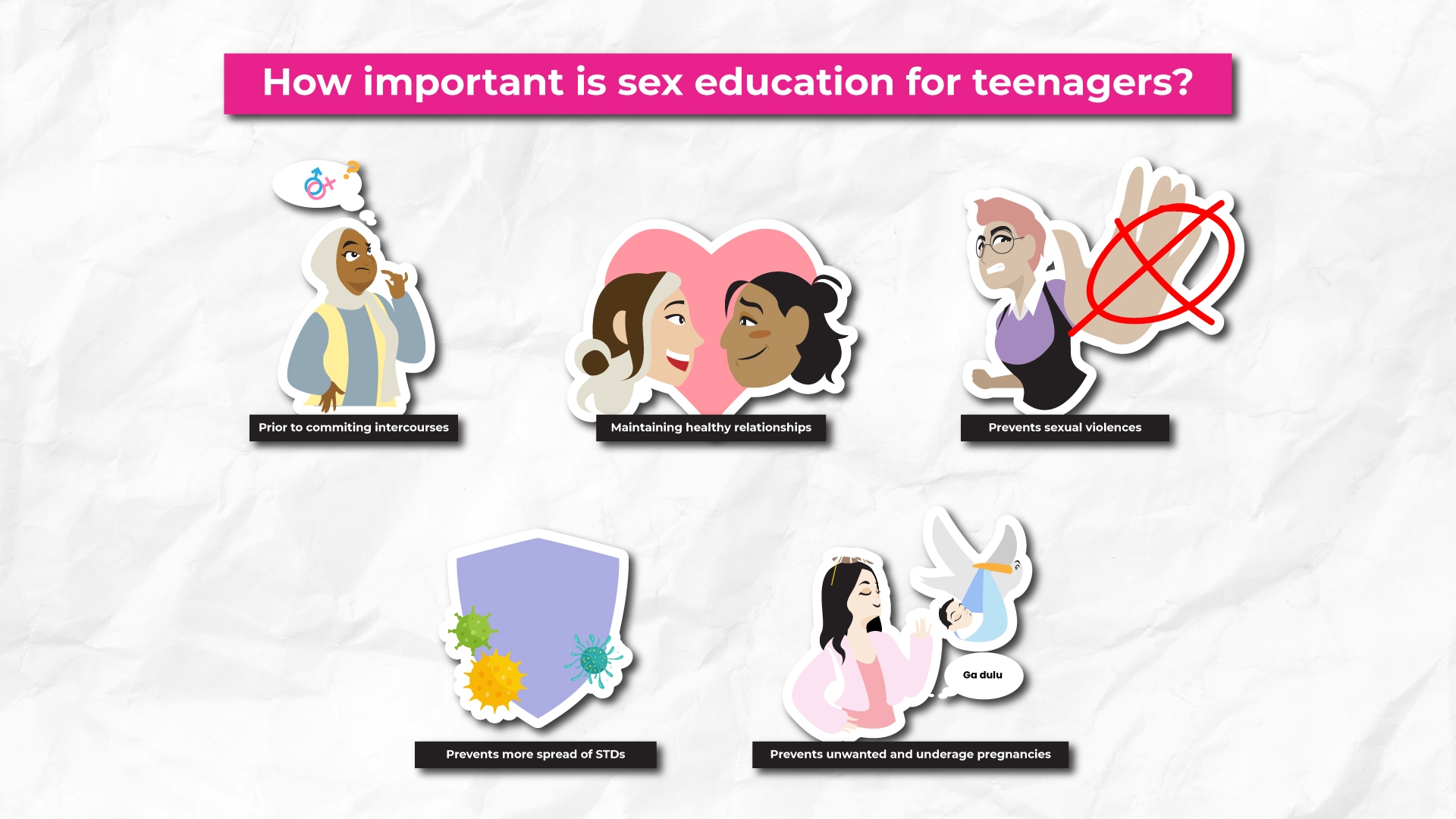
Visual 3: Reasons why sex education is important.
There is general agreement that school needed to adopt a more comprehensive sexual education. This also emerged during a roundtable discussion organized by Magdalene for this project on Dec. 1.
Jessica Suciandy, a second-grade high school student in Makassar, for example, talked about the lack of sex education in her school: “We don't get sex education at school, just the stuff about the reproductive system in Biology class, starting from the reproductive system, fertilization, menstruation, sexually transmitted diseases, and so on,” she explained. Teenagers need to learn about the sexuality part, in addition to the reproductive part, she added.
According to child and developmental psychology expert from the University of Texas, John W. Santrock, adolescence is a critical period generally characterized by biological, cognitive, and socio-emotional changes. Women experience menstruation, men have wet dreams and both gender start to develop sexual attraction to opposite or same sex.
Santrock said sex education can function as a compass of knowledge so teenagers can understand risk factors and responsibility, recognize their own values and sexuality, and exercise self-control. Instead of focusing only on abstinence, sex education should also provide guidance for those who are already sexually active, either with themselves or with other people.
Teenagers need to know everything related to their sexuality, from how menstrual flow is liked to vulnerability to anemia, the functions of genital organs, safe sex, the importance of consent in having sex, relational violence, and sexual satisfaction. These aspects are difficult for students to get if they only rely on the existing school curriculum, especially if they rely on dubious sources such as pornography, random articles on the internet, or random information from social media.
Stella Masaharu, a parent of a third-grade junior high school students, stated the importance of sex education: “As a parent, I can teach simple things, such as genitalia, menstruation, or which parts of the body should not be touched, like the vagina, the buttock, and breasts. However, parents have their own limitations, especially because they are fighting against the information giant that is the internet.”
Rudolf Valantino, Deputy Principal at Charisma Global School Tangerang concurred. He admitted that sex education is still not considered urgent by most teachers, resulting in the scant material currently being taught on this subject.
"I agree, it is important that sex education is taught continuously from the elementary, junior high, and high school levels," said Rudolf. He admitted that he was not familiar with the reproductive health modules developed by the Ministry of Education, Culture, Research and Technology.
2nd Survey Finding: Teens Turns to Porn for Information
The lack of comprehensive sex education in school drives young people to look for other alternative sources of information. Magdalene’s survey found that internet sites or digital applications, movies or videos, and friends were the three main sources of sex education most frequently cited by respondents. School teachers only come in fifth place.
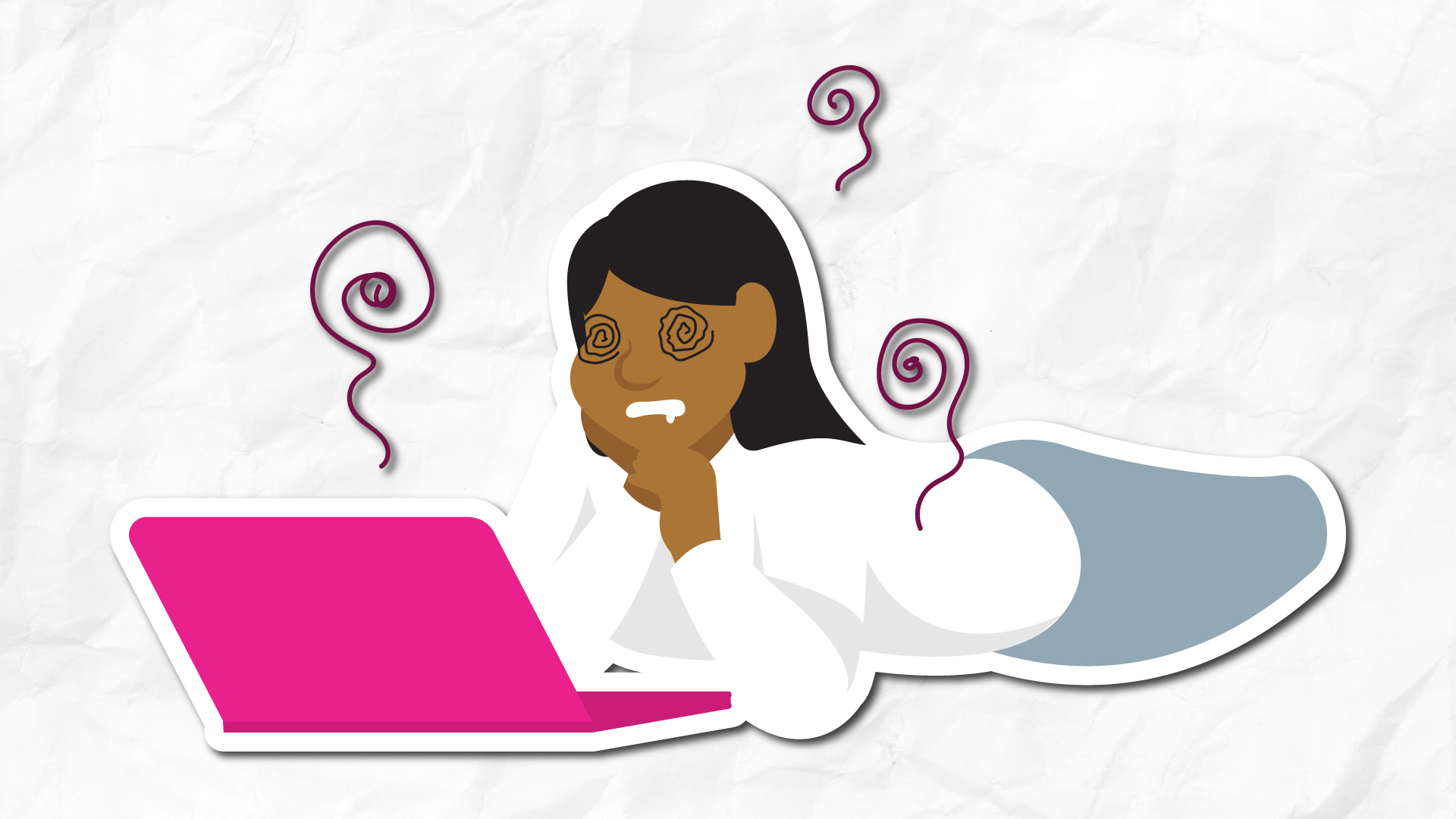
A total of 16.88 percent respondents use pornographic content as a learning resource for sex education.
Interestingly, 16.88 percent of respondents admit to turning to porn films to learn about sex. While a healthy dose of porn consumption for adults might be harmless, using porn for sexuality is problematic for many reasons. Aside from the fact that porn rarely ever portrays a realistic sexual relationship, a lot of pornographic content glorify violence. Sociologist fro Universitas Indonesia, Diana Teresa Pakasi. said pornographic content that sexualize violence can influence the way teenagers interpret their own relationships, sexual or not. After all, pornographic content is, understandably, meant to entertain, not educate.
“Pornographic content cannot be separated from objectification and sexualization of women, which lead to violence and even perpetuate rape culture. I'm worried that content that objectifies violence is now considered normal by teenagers," Diana said.
Still, our survey shows that the adolescent respondents actually have a basic understanding of sexuality. This can be seen from their answers when their knowledge is tested in the survey with a number of true and false statements. For example, in a statement that says swimming with the opposite sex can lead to pregnancy, 94.07 percent of respondents answered with “false.” This shows much better knowledge than a member of the Child Protection Commissioner who a few years ago had to publicly apologized after claiming in an interview that pregnancy could occur via water in swimming pools.
When the respondents are tested with a statement that vagina does not always have to bleed the first time a woman has sex, as many as 80 percent answered "true", 8.64 percent answered “false”, and the rest chose “do not know.” This is an important finding considering the concept of virginity (or the loss of it) is one of the contributing factors to dating violence.
3rd Survey Finding: Fighting Relational Violence with Sex Education
Another important finding from the survey is that 1 in 10 respondents who had been in a romantic relationship said they had been victims of violence. Of the 42 who experienced violence six were men. The forms of violence they experienced include verbal, psychological, sexual, extortion, online violence, and a combination of two or more. Of all the respondents who experienced such violence, only 63.21 percent said they had received sex education.
This supports the data from the National Commission on Violence Against Women (Komnas Perempuan) that out of nearly 300 thousand cases of violence against women in 2020, dating violence ranks second or 20 percent in the category of violence in the private sphere.
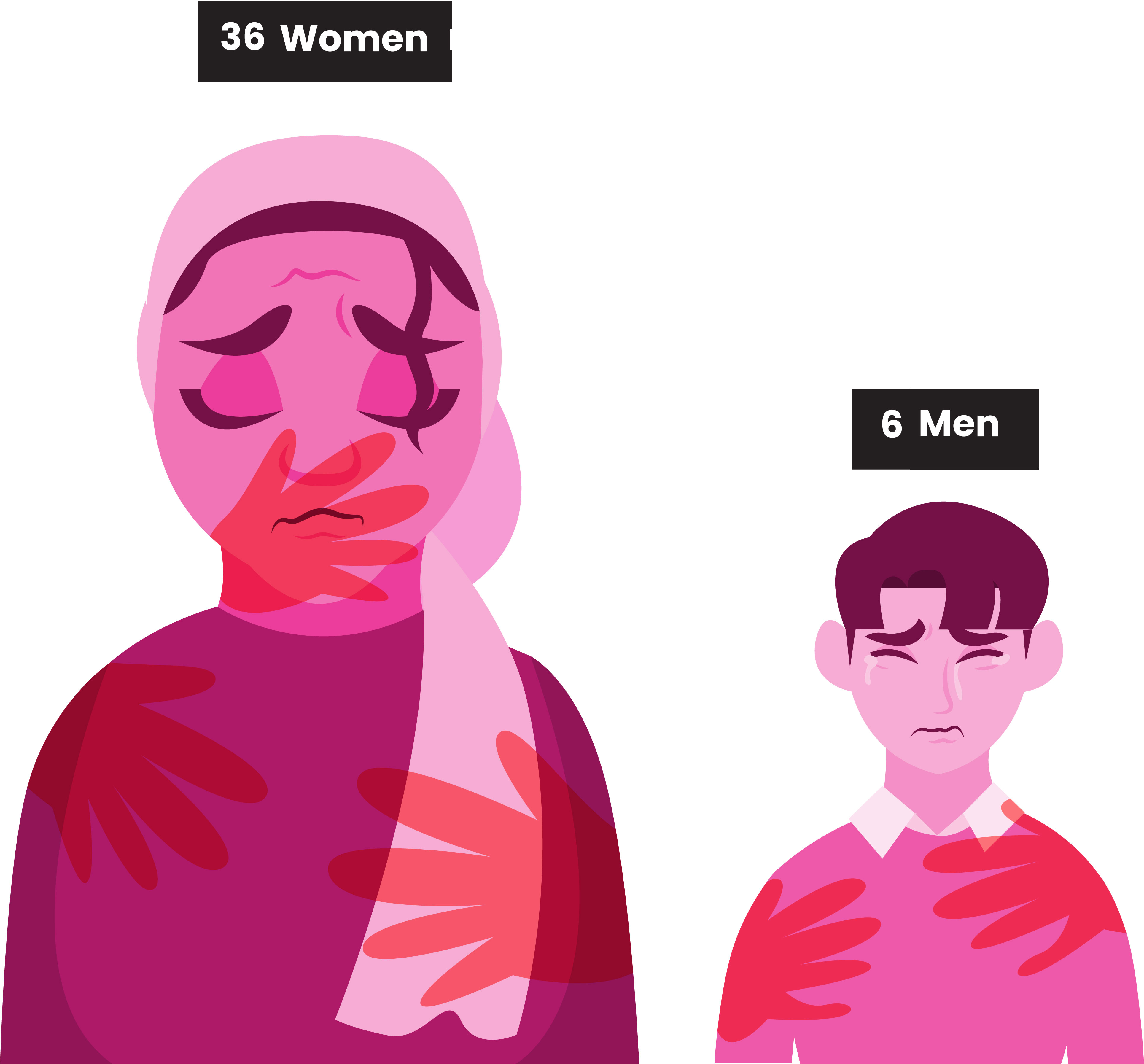
Visual 6: Percentage of respondents who experienced violence, the types of violence.
For many teenagers, violence occurs repeatedly within their relationship. Often victims are not aware that they are in a cycle of violence, much less able to identify the violence they have experienced. Building a comprehensive, and age- and culture-appropriate sex education therefore must incorporate topics of violence, particularly gender-based violence.
Comprehensive Sex Education
During the discussion, Director of the Initiative for Changes in Access to Health (IPAS) Marcia Soumokil said some schools have actually offered sex education or reproductive health education, but not structured enough.
"We know that some sex education content have started to be integrated into subjects in formal schools as well as in the community, whether through the mass media, social media, or family. However, we have to agree that sex education for teenagers has not been packaged comprehensively.”
This was echoed by the Head of the National Population and Family Planning Agency (BKKBN) Hasto Wardoyo.
This was echoed by the Head of the National Population and Family Planning Agency (BKKBN) Hasto Wardoyo. "We are fighting an uphill battle: Ignorance. Maybe a lot of people don't understand that sex education is not about teaching sex intercourse, but also how to recognize the pathological conditions of men and women. What is normal and abnormal in menstruation. How unsafe sex can pose risks. I have been actively involved in this field since 1997, but have never seen a major breakthrough when it comes to mainstreaming sexual education,” he said during the discussion.
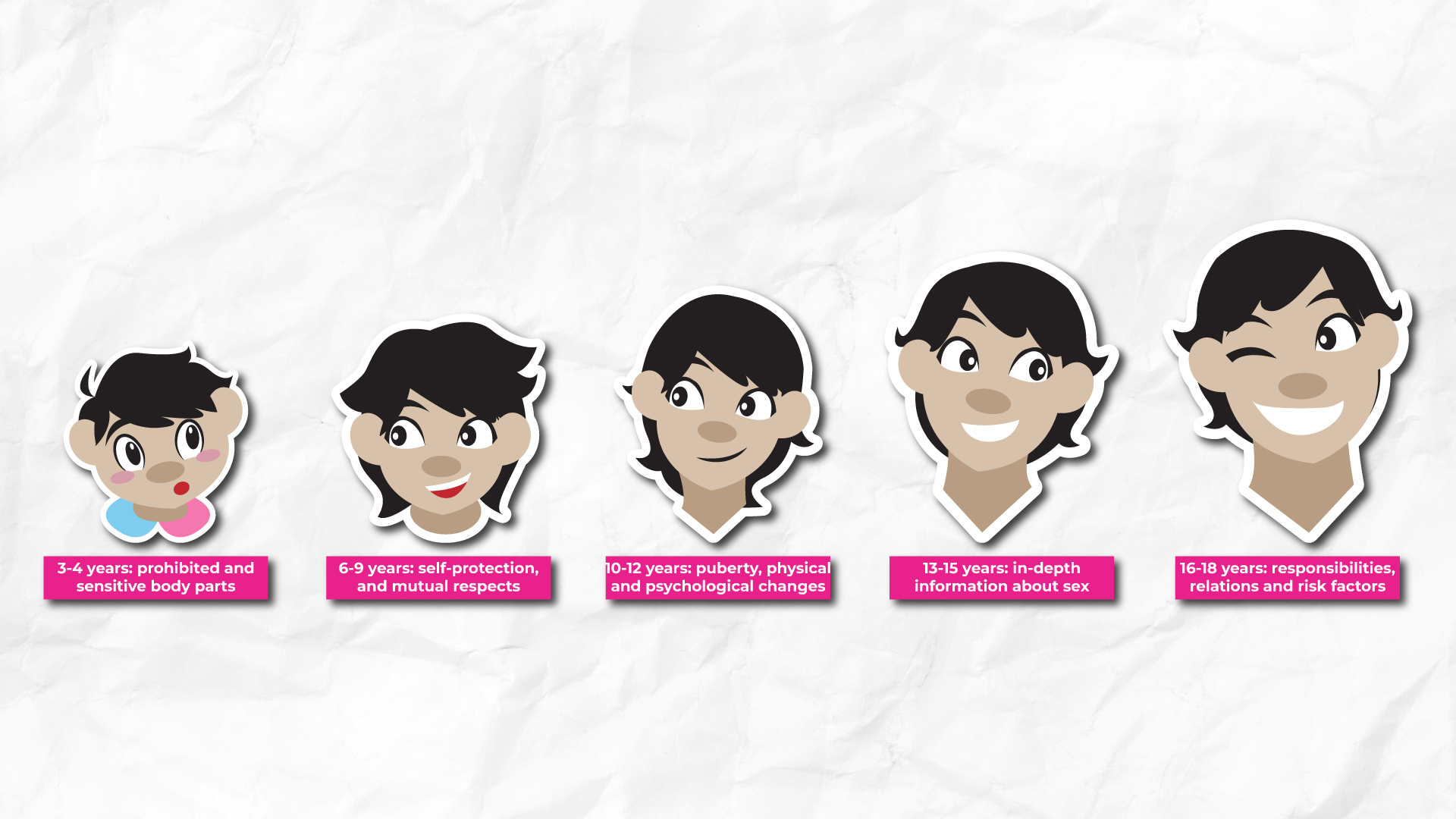
Visual 7: Age-appropriate sex education.
Article 136 paragraphs (1) and (2) of the Health Law Number 36 of 2009, for example, states that adolescent health care is aimed at preparing them to become healthy and productive adults, both socially and economically, and is carried out so that they are free from various health problems that can hinder the ability to live a healthy reproductive life.
This rule is interpreted in programs that focus on preventing teenagers from having sex outside of marriage. BKKBN’s program called Generation Plan (GenRe) Goes to School, could be used as a means to mainstream sex education. But the program focuses on abstinence, child marriage and drugs.
In its website, UNESCO states that comprehensive sex education must include cognitive, emotional, physical, and social aspects of sexuality. The aim is to equip children and youth with the knowledge, skills, attitudes, and values that can empower them to: be aware of matters relating to their health, well-being and dignity; develop respectful social and sexual relationships; consider how their choices affect their well-being and that of others; and understand and ensure that their rights are protected.
When asked what their idea of a good sex education is, the survey’s respondents’ answers vary but show an understanding of the dimensions of adolescent sexuality, ranging from sexual drive, self-pleasure, risky behavior, healthy relationships, religious teachings, cultural norms, reproductive health factors, and social risks.
“Sex education should not only discuss reproductive organs and the concept of abstinence like the one I received at school, which basically talk about risks of social, religious sanctions, and fearmongering about sexually transmitted diseases,” wrote Akbar, a 17-year-old respondent from Bangka Belitung.
Abstinence alone is not enough to stop some people from having sex, he said, citing that learning about safe sex, consent, as well as risks and responsibilities after having sex is very important.
Similarly, Rena from North Jakarta said that comprehensive sex education should teach teenagers complete knowledge of the reproductive system, consent, open communication with partners, respect for personal sexuality preferences, and positive sex.
In the end, it is neither healthy nor constructive to talk about sex education for teenagers, but excluding their voices and needs. If teenagers demand a new revolution in the approach to sex education, then discussions and discourses on sex education must be needs-driven, evidence-based, and free from misleading assumptions about teens themselves.
Other Articles
Comprehensive Sex Ed Offers Solution to Teen Relational Violence
As a group that is vulnerable to gender violence, teens need comprehensive sex education based on gender equality.
Safe Sex for Teens: Lacking Education, Hindered by Stigma
Teenagers' decision to have sex out of curiosity indicates a lack of education about 'safe sex' and reproductive health.
What Teens Need: Comprehensive Sex Education
Comprehensive sex education is more than teaching about sexuality and reproductive system.
In the Absence of Sex Ed, Teens Turn to Porn
In the absence of sex education, teenagers turn to teach them about what they don’t know.
What They Said
Quiz
Project Team of Sex Education for Teenagers
Chief Editor:
Devi Asmarani
Managing editor:
Purnama Ayu Rizky
Editor:
Patresia Kirnandita
Reporter/Researchers:
Aurelia Gracia, Elma Adisya, Jasmine Floretta, Tabayyun Pasinringi
Graphic designer:
Jeje Bahri
Web Developer:
Denny Wibisono
Social Media:
Siti Parhani
SEO Specialist:
Kevin Seftian
Community Outreach:
Paul Emas
Data Analyst:
Wan Ulfa Nur Zuhra (IDJN)




